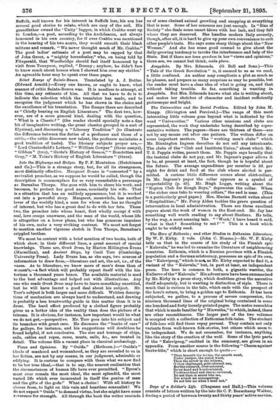her fiction, are not by any means, in our judgment,
admirable or edifying. It is curious to compare with them what we now find to be her true ideal,—that is to say, the nearest realisation that the circumstances of human life have ever permitted. " Byron's must ever remain the most ideal, the most splendid, the most varied life which ever incarnated in itself the genius of man and the gifts of the gods." What a choice ! With all history to choose from, to light on this vain and heartless sensualist ! We do not expect" Guide." to demand virtue, but she might have some nverence for strength. All through the book the writer reminds
us of some chained animal growling and snapping at everything that is near. Some of her censures are just enough. In "Sins of Society" she deals some smart blows with her lash, and they fall where they are deserved. She handles modern Italy severely, though, after all, it is hard to give up your own convenience to suit other people's taste. She says some sharp things about the "New Woman." And she has some good counsel to give about the daily-growing tendency to invoke the interference and help of the State. But if there are bona gumdam in her "views and opinions," there are, we cannot but think, male plura.


































 Previous page
Previous page